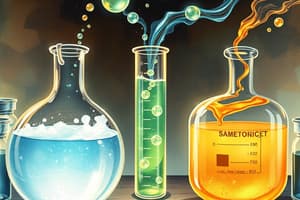Podcast
Questions and Answers
Which branch of chemistry focuses on substances containing carbon?
Which branch of chemistry focuses on substances containing carbon?
- Organic Chemistry (correct)
- Biochemistry
- Physical Chemistry
- Inorganic Chemistry
Which type of research is aimed at solving practical problems?
Which type of research is aimed at solving practical problems?
- Exploratory Research
- Theoretical Research
- Basic Research
- Applied Research (correct)
What characteristic defines a pure substance?
What characteristic defines a pure substance?
- It can be easily separated into its components
- It possesses a unique set of properties (correct)
- It has a variable composition
- It consists of multiple types of atoms
Which branch of chemistry utilizes mathematics and computers to predict chemical behavior?
Which branch of chemistry utilizes mathematics and computers to predict chemical behavior?
Which property of matter changes the identity of the substance when observed?
Which property of matter changes the identity of the substance when observed?
What is the main focus of analytical chemistry?
What is the main focus of analytical chemistry?
What distinguishes extensive properties from intensive properties?
What distinguishes extensive properties from intensive properties?
Which type of matter cannot be broken down into simpler substances?
Which type of matter cannot be broken down into simpler substances?
What characterizes a heterogeneous mixture?
What characterizes a heterogeneous mixture?
In which separation method are magnetic properties utilized?
In which separation method are magnetic properties utilized?
Which type of element is characterized by being poor conductors of heat and often gaseous at room temperature?
Which type of element is characterized by being poor conductors of heat and often gaseous at room temperature?
What distinguishes chemical changes from physical changes?
What distinguishes chemical changes from physical changes?
Which method is best used to separate a solid from a liquid that cannot pass through a filter?
Which method is best used to separate a solid from a liquid that cannot pass through a filter?
What characteristic do metalloids exhibit?
What characteristic do metalloids exhibit?
Which of the following is a defining feature of noble gases?
Which of the following is a defining feature of noble gases?
Which aspect of the scientific method is concerned with making measurements?
Which aspect of the scientific method is concerned with making measurements?
Study Notes
Overview of Chemistry
- Study of compositions, structures, properties of matter, and the changes matter undergoes.
- Both living and non-living matter contains chemical components.
- Chemistry is interconnected with both biological and physical sciences.
Branches of Chemistry
- Organic Chemistry: Examines carbon-containing compounds.
- Inorganic Chemistry: Focuses on non-organic substances, including organometallics.
- Physical Chemistry: Investigates properties and changes of matter and their energy relations.
- Analytical Chemistry: Identifies components and compositions of materials.
- Biochemistry: Studies substances and processes in living organisms.
- Theoretical Chemistry: Utilizes mathematics and computers to predict chemical behavior and properties.
Types of Research
- Basic Research: Aims to increase knowledge.
- Applied Research: Solves practical problems.
- Technological Development: Uses existing knowledge for convenience.
Properties of Matter
- Physical Properties: Observable without changing substance identity.
- Chemical Properties: Observed during changes to substance identity.
- Intensive Properties: Do not depend on the amount of matter.
- Extensive Properties: Depend on the amount of matter present.
Matter Composition
- Pure Substances:
- Fixed composition with unique properties.
- Comprised solely of one type of matter.
- Elements: Cannot be broken down, consist of one type of atom.
- Compounds: Can be decomposed into simpler substances.
- Mixtures:
- Composed of two or more substances.
- No fixed proportions, separable into components.
- Homogeneous: Uniform composition.
- Heterogeneous: Distinct portions with different properties.
Separation Methods
- Filtration: Separates solids from liquids in heterogeneous mixtures.
- Distillation: Separates liquids in homogeneous mixtures.
- Magnetic Separation: Isolates magnetic solids from mixtures.
- Decantation: Utilizes gravity to separate solids from liquids.
- Sublimation: Separates volatile solids from non-volatile solids.
Changes in Matter
- Physical Changes: Do not alter the identity of the substance.
- Chemical Changes: Result in a change in the identity of the substance.
Elements
- Pure substances that cannot be decomposed by chemical changes.
- Serve as building blocks of matter with characteristics based on chemical properties.
Types of Elements
- Metals:
- Good electrical conductors, malleable, high tensile strength, silver/grayish-white luster.
- Nonmetals:
- Poor heat conductors, brittle solids, often gases at room temperature, low tensile strength.
- Metalloids:
- Exhibit properties of both metals and nonmetals, solid at room temperature, semiconductors.
- Noble Gases:
- Group 18 elements, gases at room temperature, generally unreactive, used in lighting and balloons.
Scientific Method
- Logical problem-solving approach involving:
- Observing and collecting data.
- Formulating qualitative and quantitative hypotheses.
- Testing hypotheses to develop supported theories.
Studying That Suits You
Use AI to generate personalized quizzes and flashcards to suit your learning preferences.
Related Documents
Description
Test your knowledge on mixtures and their properties in chemistry. This quiz covers concepts such as homogeneous and heterogeneous mixtures, along with methods for separating components like filtration and distillation. Challenge yourself and discover how well you understand these fundamental ideas!




